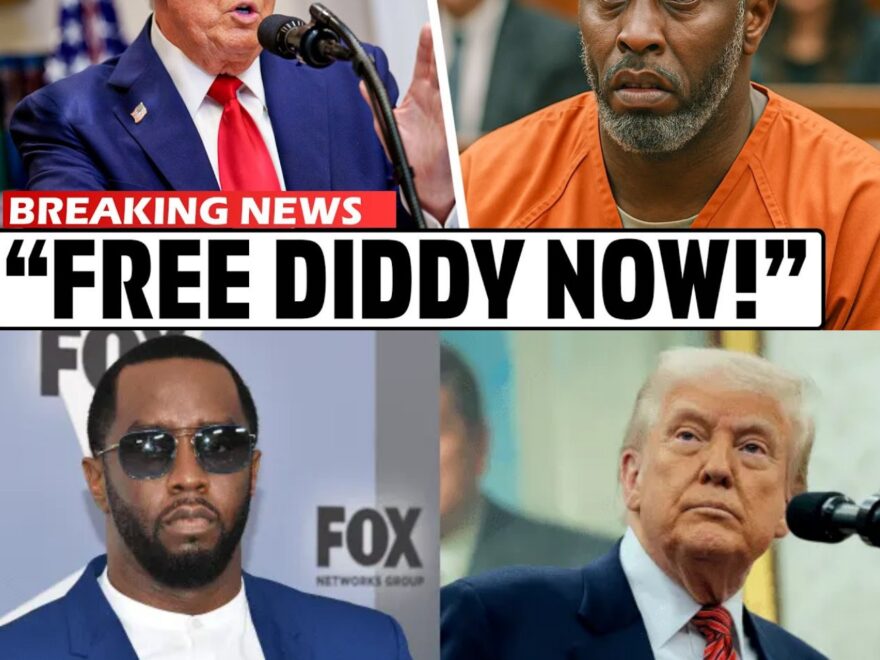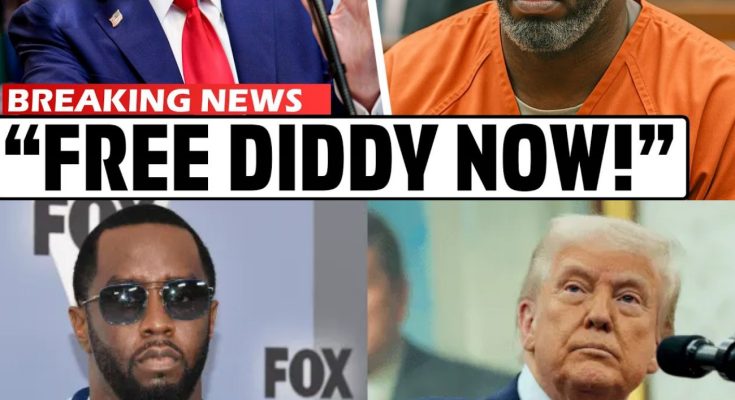
Diddy’s Prison Sentence Could Be Overturned as Donald Trump Joins the Fight for His Freedom
In a dramatic turn of events, the case of renowned music mogul Sean “Diddy” Combs has taken on a new dimension as former President Donald Trump publicly expresses his support for the hip-hop icon’s bid for freedom. With Diddy’s legal team mounting a vigorous appeal against his prison sentence, Trump’s involvement is set to escalate the case from a legal battle into a major cultural and political phenomenon. As the world watches closely, the intersection of celebrity, politics, and justice could reshape the legal landscape and ignite a nationwide debate on fairness in the American judicial system.

A Timeline of Diddy’s Legal Battle
The saga began when Diddy, a multi-platinum recording artist, entrepreneur, and influential figure in the entertainment industry, was convicted on charges widely debated in the court of public opinion. While the specific details of the legal case remain subject to various interpretations, what’s clear is that Diddy’s imprisonment has sparked controversy across the country. His supporters argue that the proceedings were marred by bias and inconsistencies, while detractors insist that justice has run its course.
Upon sentencing, Diddy’s lawyers moved quickly to file an appeal, citing several alleged procedural errors during the trial. They argue that evidence was mishandled, key witnesses were not given a fair hearing, and that the trial received disproportionate media attention, leading to what they call a “trial by public opinion” rather than by the rule of law. As the appeals process unfolds, an unexpected ally has entered the fight: Donald Trump.
Donald Trump’s Involvement: A Surprising Alliance
Donald Trump, never one to shy away from controversy, announced his support for Diddy in a series of social media posts. “I’ve always respected Diddy as an entrepreneur and an American success story,” Trump wrote on Truth Social, his platform. “We need to make sure the legal system is FAIR. Too often, high-profile individuals are treated differently—sometimes for political reasons.” He then added, “It’s time we take a real look at this case. Let’s stand together for justice!”
This intervention is significant for several reasons. Firstly, Trump’s influence among his political base is considerable, and his backing could mobilize public opinion in favor of a review or even a reversal of Diddy’s sentence. Secondly, Trump’s previous actions—issuing presidential pardons to a variety of celebrities and political figures—demonstrate his belief in using the powers of his position, or his voice, to spotlight perceived injustices.
Legal analysts note that Trump’s involvement doesn’t automatically translate into immediate legal relief, but it brings public scrutiny to the case and could influence how the appeals process is perceived or conducted. “When a former president gets involved, the stakes get higher,” said legal expert Andrew Hackett. “It can put pressure on the courts to ensure an excess of transparency and fairness.”
Reverberations Across the Entertainment Industry
The alliance between Diddy and Donald Trump has caught the attention of the entertainment industry, which has a long history of celebrity legal battles attracting intense public fascination. Artists, fellow musicians, producers, and actors have weighed in on social media. Some members of the hip-hop community have lauded Trump’s intervention, pointing to the need for solidarity against what they see as institutional injustices. Others express skepticism, questioning Trump’s motives and the potential political calculation behind his support.
In recent years, discussions around high-profile legal cases have increasingly intertwined with broader social justice issues. The Diddy case joins a list of instances where the intersection of celebrity, race, and the legal system has prompted calls for reform. Critics claim that celebrities can use their platforms to sway opinion, while supporters argue that fame alone does not protect celebrities from systemic issues in the justice system.
Could Diddy’s Sentence Really Be Overturned?
From a legal perspective, overturning a prison sentence is a challenging process. Appellate courts review the records to determine whether errors were made that could have reasonably affected the outcome of the trial. Diddy’s legal team has reportedly compiled a comprehensive brief outlining several grounds for appeal, including concerns over due process, jury impartiality, and evidentiary issues.
The involvement of public figures like Trump does not directly affect the court’s decision, but the heightened spotlight can influence the broader climate. In some cases, media attention can inspire new testimony, encourage whistleblowers to come forward, or even prompt prosecutors to reconsider their opposition to a new trial.
Meanwhile, legal scholars caution that while celebrity and political involvement can bring needed scrutiny, it also risks undermining public confidence in the objectivity of the legal process. “Ideally, the law should operate independently of politics and public opinion,” explains constitutional law professor Jasmine Riley. “But we can’t ignore the reality that attention and advocacy sometimes move mountains.”

The Broader Meaning: Justice, Fairness, and Influence
Diddy’s quest for justice—now amplified by Trump’s endorsement—raises urgent questions about fairness in America’s legal system. Is the system equally just for the rich and famous? How much does public opinion, fueled by celebrity and political power, shape legal outcomes? And perhaps most importantly, what safeguards exist to protect the integrity of justice for everyone, regardless of status or influence?
For Diddy and his supporters, the hope is that newfound attention will correct any miscarriage of justice. For critics, the fear is that political alliances may overshadow the merits of the case.
As the appeal works its way through the courts, one thing is clear: Diddy’s fight for freedom is no longer just a legal battle—it has become a touchstone for larger debates about justice and influence in twenty-first-century America. With Donald Trump now in his corner, the outcome will reverberate beyond the courtroom and into the halls of power, popular culture, and the ongoing quest for justice reform.
The nation now watches, waiting to see whether the combined weight of celebrity, political intervention, and legal advocacy will sway the scales of justice—or simply spark a new chapter in an already turbulent era for America’s courts and culture.

